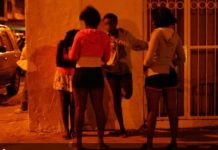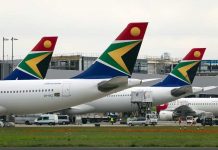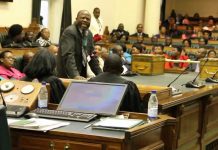President Cyril Ramaphosa has announced a R500 Billion stimulus package, which amounts to 10% of South Africa’s GDP, meant to rejuvinate the economy heavily battered by the effects of Covid-19.
A R200 billion loan guarantee scheme will be launched to assist businesses and Companies with a turnover of less than R300 million per year.
“The coronavirus will lead to many people losing their jobs. An additional R100 billion will be set aside to protect jobs,” Ramaphosa says.
Over 700,000 businesses and 3 million workers are set to benefit.
R50 billion will go towards social grants, in which child grant recipients will receive R300 in May and R500 in June.
Below is President’s Full Speech
My Fellow South Africans,
It is 25 days since South Africa began a nation-wide lockdown to contain the spread of the coronavirus.
It has demanded of you great fortitude and endurance.
It has caused you much suffering and required much sacrifice. Once again, I salute you and I thank you.
The coronavirus pandemic has disrupted your lives and damaged our economy. Its severity will continue to take a heavy toll in the weeks and months to come.
The pandemic has resulted in the sudden loss of income for businesses and individuals alike, deepening poverty and increasing hunger.
The urgent and dramatic measures we have taken to delay the spread of the virus have been absolutely necessary.
They have given us the space to better respond to the inevitable rise in infections and to thereby save tens of thousands of lives.
While the nation-wide lockdown is having a devastating effect on our economy, it is nothing compared to the catastrophic human, social and economic cost if the coronavirus could spread among our people unchecked.
Medical scientists and our doctors inform us that we are still in the early stages of this pandemic.
Without proven therapeutic medicines or a vaccine, we can expect this to continue as a problem for the foreseeable future.
Our foremost priority now is to intensify the health interventions needed to contain and delay the spread of the disease and to save lives.
To date, the coronavirus has taken the lives of at least 58 people in our country.
This is a loss that we all mourn, for we know the pain and the anguish of their loved ones.
From the more than 126,000 tests conducted, 3,465 confirmed cases of coronavirus have been identified.
More than 2 million people have been screened in communities across the country and, of these, over 15,000 have been referred for testing.
Alongside this unprecedented public health effort are the measures we are taking to protect livelihoods, to stave off hunger and destitution and to set our economy on a path of recovery.
This evening, I wish to address you on our economic and social response to this global health emergency.
The pandemic requires an economic response that is equal to the scale of the disruption it is causing.
Our economic response can be divided into three phases.
The first phase began in mid-March when we declared the coronavirus pandemic as a national disaster.
This included a broad range of measures to mitigate the worst effects of the pandemic on businesses, on communities and on individuals.
The measures included tax relief, the release of disaster relief funds, emergency procurement, wage support through the UIF and funding to small businesses.
We are now embarking on the second phase of our economic response to stabilise the economy, address the extreme decline in supply and demand and protect jobs.
As part of this phase, we are announcing this evening a massive social relief and economic support package of R500 billion, which amounts to around 10% of GDP.
The third phase is the economic strategy we will implement to drive the recovery of our economy as the country emerges from this pandemic.
Central to the economic recovery strategy will be the measures we will embark upon to stimulate demand and supply through interventions such as a substantial infrastructure build programme, the speedy implementation of economic reforms, the transformation of our economy and embarking on all other steps that will ignite inclusive economic growth.
We will outline this in coming days.
Over the past few days, we have been in consultations with various stakeholders.
We have met with business, labour and the community constituency in NEDLAC.
We have met with Premiers, MECs and Metro Mayors and with the members of the Presidential Economic Advisory Council.
Following these meetings, Cabinet considered various proposals and finalised the social relief and economic support package that stands at the centre of the second phase of our economic response.
This involves:
Firstly, an extraordinary health budget to respond to coronavirus, Secondly, the relief of hunger and social distress,
Thirdly, support for companies and workers, Fourthly, the phased re-opening of the economy.
The impact of the coronavirus requires an extraordinary coronavirus budget – of around R500 billion – to direct resources towards fighting the pandemic.
This will include the reprioritisation of around R130 billion within the current budget.
The rest of the funds will be raised from both local sources, such as the Unemployment Insurance Fund, and from global partners and international finance institutions.
To date, the World Bank, International Monetary Fund, BRICS New Development Bank and the African Development Bank have been approached and are working with the National Treasury on various funding transactions.
Some of these institutions have created financing packages that are aimed at assisting countries that are having to address the coronavirus crisis like us.
This funding will be used, in the first instance, to fund the health response to coronavirus. An amount of R20 billion will be directed to addressing our efforts to address the pandemic.
If we are to successfully manage the anticipated surge in cases and ensure that everyone who needs treatment receives it, we must provide for additional expenditure on personal protective equipment for health workers, community screening, an increase in testing capacity, additional beds in field hospitals, ventilators, medicine and staffing.
The nation-wide lockdown has had a negative impact on the revenue of municipalities at a time when the demands on them are increasing.
Additional funding of R20 billion will therefore be made available to municipalities for the provision of emergency water supply, increased sanitisation of public transport and facilities, and providing food and shelter for the homeless.
Details will be announced in the adjustment budget tabled by the Minister of Finance.
Another significant area that requires massive additional expenditure is the relief of hunger and social distress in our communities across the country.
While we have put in place measures to protect the wages of workers in the formal economy and have extended support to small, medium and micro-sized businesses, millions of South Africans in the informal economy and those without employment are struggling to survive.
Poverty and food insecurity have deepened dramatically in the course of just a few weeks.
To reach the most vulnerable families in the country, we have decided on a temporary 6- month Coronavirus grant.
We will direct R50 billion towards relieving the plight of those who are most desperately affected by the coronavirus.
This means that child support grant beneficiaries will receive an extra R300 in May and from June to October they will receive an additional R500 each month.
All other grant beneficiaries will receive an extra R250 per month for the next six months.
In addition, a special Covid-19 Social Relief of Distress grant of R350 a month for the next 6 months will be paid to individuals who are currently unemployed and do not receive any other form of social grant or UIF payment.
The Department of Social Development will issue the requirements needed to access and apply for this funding.
We have recognised that the food distribution capacity of government is not adequate to meet the huge need that has arisen since the start of the epidemic.
The South African Social Security Agency – SASSA – will within days implement a technology-based solution to roll out food assistance at scale through vouchers and cash transfers to ensure that help reaches those who need it faster and more efficiently.
In addition, to fill the immediate need, the Department of Social Development has partnered with the Solidarity Fund, NGOs and community-based organisations to distribute 250,000 food parcels across the country over the next two weeks.
We are deeply disturbed by reports of unscrupulous people abusing the distribution of food and other assistance for corrupt ends.
We will not hesitate to ensure that those involved in such activities face the full might of the law.
While there are several interventions that already exist within government to deal with the extremely high unemployment such as the Expanded Public Works Programme and the community works programme, these are not enough.
The coronavirus crisis will lead to many people losing their jobs.
An additional R100 billion will be set aside for protection of jobs and to create jobs.
Since the declaration of a state of national disaster over a month ago, government has put in place a range of measures to support workers’ wages and assist companies in distress.
By the end of today, the UIF’s special COVID-19 benefit has paid out R1.6-billion, assisting over 37,000 companies and 600,00 workers.
R40 billion has been set aside for income support payments for workers whose employers are not able to pay their wages.
We continue to provide assistance – in the form of loans, grants and debt restructuring – to SMMEs, spaza shop owners and other informal businesses.
The value of this assistance to date is over R100 million.
An additional amount of R2 billion will be made available to assist SMEs and spaza shop owners and other small businesses.
The IDC facility to support companies to procure or manufacture personal protective equipment has been utilised in the past few weeks, with finance of R162 million approved to date.
Other forms of support have been extended to artists, athletes and technical personnel, as well as to waste pickers and public works participants in the environment sector.
While these measures are providing obvious relief to many companies and workers, it is clear that there is a far greater need across the entire economy.
We will therefore be introducing a R200 billion loan guarantee scheme in partnership with the major banks, the National Treasury and the South African Reserve Bank.
This will assist enterprises with operational costs, such as salaries, rent and the payment of suppliers.
In the initial phase, companies with a turnover of less than R300 million a year will be eligible.
It is expected that the scheme will support over 700,000 firms and more than 3 million employees through this difficult period.
A number of the banks are ready to roll out the product before the end of the month.
Government is also working on additional support measures for vulnerable and affected sectors like the taxi industry.
In addition to existing tax relief measures, we will also be introducing a 4-month holiday for companies’ skills development levy contributions, fast-tracking VAT refunds and a 3-month delay for filing and first payment of carbon tax.
To assist a greater number of businesses, the previous turnover threshold for tax deferrals is being increased to R100 million a year, and the proportion of PAYE payment that can be deferred will be increased to 35 percent.
Businesses with a turnover of more than R100 million a year can apply directly to SARS on a case-by-case basis for deferrals of their tax payments.
No penalties for late payments will be applicable if they can show they have been materially negatively impacted in this period.
Taxpayers who donate to the Solidarity Fund will be able to claim up to an additional 10 percent as a deduction from their taxable income.
In total these tax measures should provide at least R70 billion in cash flow relief or direct payments to businesses and individuals.
The Minister of Finance will provide further details on the above and other tax-related announcements.
In the implementation of all these measures, we are determined to ensure that women, youth and persons with disability received particular attention and support.
The South African Reserve Bank has also made an important contribution to support the real economy.
In line with its Constitutional mandate, it has cut the repo rate by 200 basis point, in effect unlocking at least R80 billion in the real economy, and taking other steps to provide additional liquidity to the financial system.
Several commercial banks and insurance companies have also assisted the economic relief effort by, among other things, delaying or reducing instalment payments, providing debt relief, and waiving bank fees for grant beneficiaries.
The fourth area on which Cabinet has resolved is the phased re-opening of the economy.
We will follow a risk-adjusted approach to the return of economic activity, balancing the continued need to limit the spread of the coronavirus with the need to get people back to work.
As I have said previously, if we end the lockdown too soon or too abruptly, we risk a massive and uncontrollable resurgence of the disease.
We will therefore follow a phased approach, guided by the best available scientific evidence, to gradually lift the restrictions on economic activity.
As we do so, we remain firm in our resolve to contain the transmission of the virus.
We will therefore need to act with agility and flexibility in the weeks and months ahead, and respond to the situation as it develops.
On Thursday, I will address the nation on the measures that will be taken beyond the nation- wide lockdown to re-open the economy.
This crisis will not last forever, and the day will come when these measures are no longer needed.
Until then, however, we must ensure that all of our people receive adequate support. The scale of this emergency relief programme is historic.
It demonstrates that we will not spare any effort, or any expense, in our determination to support our people and protect them from harm.
We will – and we must – do whatever it takes to recover from this human, social and economic crisis.
Our country and the world we live in will never be the same.
We are resolved not merely to return our economy to where it was before the coronavirus, but to forge a new economy in a new global reality.
Our economic strategy going forward will require a new social compact among all role players – business, labour, community and government – to restructure the economy and achieve inclusive growth.
Building on the cooperation that is being forged among all social partners during this crisis, we will accelerate the structural reforms required to reduce the cost of doing business, to promote localisation and industrialisation, to overhaul state owned enterprises and to strengthen the informal sector.
We will forge a compact for radical economic transformation that ensures that advances the economic position of women, youth and persons with disabilities, and that makes our cities, towns, villages and rural areas vibrant centres of economic activity.
Our new economy must be founded on fairness, empowerment, justice and equality.
It must use every resource, every capability and every innovation we have in the service of the people of this country.
Our new economy must open new horizons and offer new opportunities. Over the past month, South Africans have opened their hearts each other.
Even at this moment when such great sacrifice is demanded of us, we look to a better future with optimism.
Even as we find ourselves at a moment of great peril, even as great sacrifices are demanded, even as we dare not allow our vigilance to waver, we look ahead to a better future.
I have faith in the strength and resilience of ordinary South Africans, who have proven time and time again – throughout our history – that they can rise to the challenge.
We shall recover. We shall overcome. We shall prosper.
May God bless South Africa and protect her people. I thank you.














